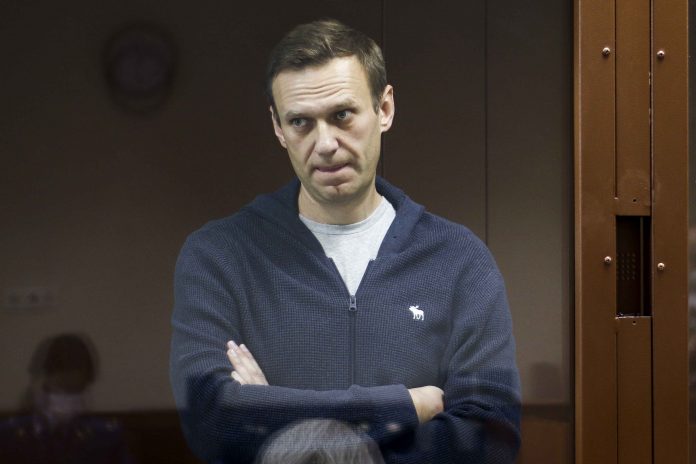
By VLADIMIR ISACHENKOV
Associated Press
MOSCOW (AP) — Russia is prepared for a split with the European Union if the EU imposes new crippling sanctions amid a dispute over the treatment of opposition leader Alexei Navalny, the nation’s top diplomat warned Friday.
In response to a question about Moscow’s willingness to rupture links with the EU, Foreign Minister Sergey Lavrov said in televised remarks that Russia doesn’t want to be isolated but must increase its self-sufficiency to face potential EU sanctions.
“We don’t want to be isolated from international life, but we must be ready for that,” Lavrov said. “If you want peace, you must prepare for war.”
Asked if Russia is heading toward a split with the European Union, Lavrov replied, “We proceed from the assumption that we are ready for that.”
He emphasized the importance of economic ties with the 27 EU nations, adding that Russia would continue engaging in mutually beneficial cooperation. At the same time, Lavrov said, Russia must prepare for the worst and increasingly rely on its own resources.
“We must achieve that in the economic sphere, if we see again, as we have felt more than once, that sanctions imposed in some areas create risks to our economy, including in the most sensitive spheres, such as supplies of parts and components,” the Russian foreign minister added.
Kremlin spokesman Dmitry Peskov emphasized that Russia wants to maintain normal ties with the EU but needs to prepare for the worst, if the bloc takes hostile actions.
“If we face a destructive course that will hurt our infrastructure, our interests, Russia must be ready in advance for such unfriendly steps,” Peskov said during a call with reporters when asked about Lavrov’s comment. “We must be self-reliant. We must ensure our security in the most sensitive strategic areas and be prepared to replace everything we could be deprived of with national infrastructure in case madness prevails and such unfriendly actions take place.”
European Commission spokesman Peter Stano said Friday the EU welcomes “mutually beneficial cooperation whenever the other side is ready for such a cooperation and for such a dialogue,” adding that Russia has “indicated that they are not really willing to go in this direction.”
German Foreign Ministry spokeswoman Andrea Sasse described Lavrov’s comments as “really disconcerting and completely incomprehensible to us.” She told reporters in Berlin that Foreign Minister Heiko Maas had made Germany’s grievances with Russia clear but also emphasized that “we are interested in cooperation with Russia.”
Russia-EU relations have sunk to new lows over Navalny’s arrest and imprisonment. The most prominent political foe of Russian President Vladimir Putin was arrested Jan. 17 upon his return from Germany, where he spent five months recuperating from the nerve agent poisoning he blamed on the Kremlin. Russian authorities have denied the allegations.
Last week, a court in Moscow sent Navalny to prison for two years and eight months for violating terms of his probation while recuperating in Germany. The probation stemmed from a 2014 embezzlement conviction that Navalny has rejected as fabricated and the European Court of Human Rights has ruled to be unlawful.
Navalny was back in court Friday on a charge of defaming a World War II veteran who was featured in a video last year advertising constitutional amendments that allowed an extension of Putin’s rule. Navalny called the people in the video “corrupt stooges,” “people without conscience” and “traitors.” He rejected the libel charges as part of Kremlin efforts to disparage him and could face a fine or community service, if convicted.
The hearings will resume on Tuesday.
European Union foreign policy chief Josep Borrell said after visiting Russia last week that the 27-nation bloc must take a firm stance in its relations with Russia and ponder new sanctions in the wake of Navalny’s prison sentence. While Borrell was meeting with Lavrov, Moscow announced the expulsion of diplomats from Germany, Poland and Sweden for attending protests in support of Navalny.
The three EU countries responded in kind Monday, each expelling a Russian diplomat.
Borrell has said he plans to submit proposals for possible actions against Russia when he chairs the next meeting of the bloc’s foreign ministers on Feb. 22.
Navalny’s arrest triggered a wave of protests across Russia that drew tens of thousands of people to the streets in the largest show of discontent in years. Authorities responded with a sweeping crackdown, detaining about 11,000 people across Russia. Many protesters were fined or given jail sentences ranging from seven to 15 days.
The United States and the European Union have urged Russia to release Navalny and to end the crackdown on protests. The Kremlin has accused them of meddling in Russia’s internal affairs and said it would not listen to Western criticism of Navalny’s sentencing and police actions against his supporters.
Lavrov accused the West of pursuing the “aggressive containment of Russia” to punish the country for its independent foreign policy.
“The sanctions wouldn’t bring any result. They wouldn’t change our course for defending our national interests,” Lavrov said.



















